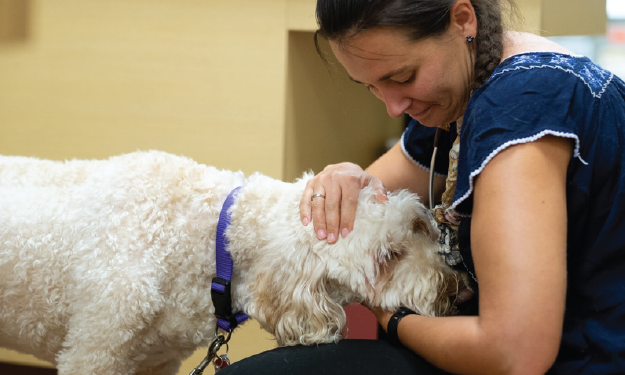Ear Tumors in Dogs & Cats

What are Ear Canal Tumors?
Ceruminous glands are modified apocrine glands (sweat glands) found within the external ear canal. Both benign and malignant tumors can arise from these glands and are the most common type of tumors within the ear canal. Additional tumor types that have been reported include; squamous cell carcinoma, carcinomas, fibromas, papillomas, hemangiosarcoma, mast cell tumors, melanomas, sebaceous glands and more. Inflammatory polyps are more commonly seen in cats, but have been reported in dogs.
What are the Symptoms?
Most tumors of the ear canal are diagnosed due to a mass effect which can mimic clinical signs such as chronicotitis or partial deafness. Patients may present for pain upon opening of the mouth, or neurologic signs. These clinical signs tend to be more common with malignant tumors.
How is it Diagnosed?
Diagnosis usually involves thorough examination, blood work, diagnostic imaging, lymph node assessment, and biopsy. A CT is often more sensitive than radiographs to determine the extent of the tumor and may be required prior to surgery or radiation therapy. Imaging and biopsy findings help to determine the prognosis and direct treatment.
What are the Treatment Options?
- Surgery: Complete surgical excision is the treatment modality of choice for ear canal tumors. This is best accomplished with a total ear canal ablation (TECA) with a lateral bulla osteotomy.
- Radiation Therapy: Radiation therapy can be effective for locoregional control of ear canal tumors. It can be used as a primary treatment or after surgery with incomplete surgical margins. Both definitiveand palliative radiation therapy options are available depending on goals of therapy. Long-term outcomes and side effects from treatment vary depending upon the stage and type of tumor. Our radiation oncologist will discuss the different radiation therapy options with you.
- Chemotherapy: Chemotherapy may be useful in the treatment of ear canal tumors. When used alone responses are typically short-lived. In some cases, combining chemotherapy with radiation therapy (either concurrently or sequentially) may improve responses.
- Medical management: Medical management of ear canal tumors depends on what the clinical signs are, but often involves antibiotics to treat secondary infections, and/or anti-inflammatory drugs.
What is the Prognosis?
There are a few factors that may influence the prognosis of animals with ear canal tumors including, extent ofdisease, grade of the tumor, histological subtype and presence of neurological signs. In general, these tumors are associated with long-term survival with appreciate local therapy.